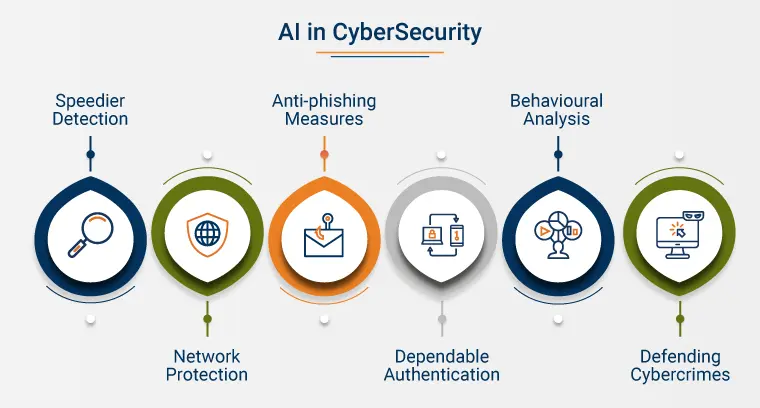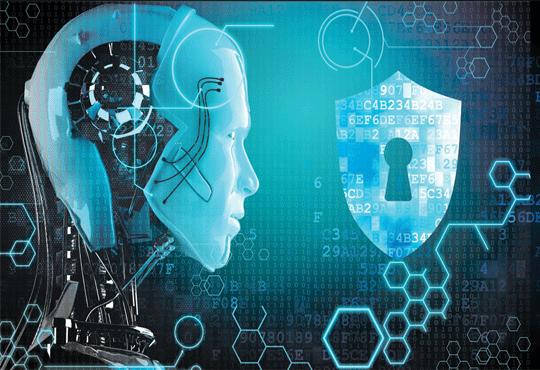As technology continues to rapidly evolve, so does the landscape of cyber threats. With each passing day, hackers are becoming more sophisticated, making it increasingly difficult for traditional security measures to keep up. This is where artificial intelligence (AI) comes into play. AI in Cybersecurity is emerging as the future of AI-Driven Cyber Defense, offering a proactive approach to detecting and mitigating cyber threats.
Incorporating AI into cybersecurity allows for real-time monitoring of network traffic, identification of potential vulnerabilities, and rapid response to emerging threats. The power of AI lies in its ability to analyze vast amounts of data and patterns, enabling it to detect anomalous behavior that humans may miss. With AI, organizations can stay one step ahead of cybercriminals and protect their sensitive data from potential breaches. According to a study by Capgemini, 69% of organizations believe that AI is essential for responding to cyber attacks effectively.


The Revolution of AI in Cybersecurity
With the increasing sophistication and frequency of cyberattacks, the cybersecurity landscape is constantly evolving. Companies and organizations are continuously searching for innovative solutions to protect their data, networks, and systems from malicious activities. One technology that has emerged as a game-changer in the field of cybersecurity is Artificial Intelligence (AI). AI has the potential to revolutionize the way we defend against cyber threats and secure sensitive information. By harnessing the power of machine learning algorithms and predictive analytics, AI-driven cyber defense systems can identify, detect, and respond to threats in real-time, leading to stronger protection and faster incident response.
The future of AI-driven cyber defense holds great promise. AI has the ability to analyze vast amounts of data at an unprecedented speed, allowing cybersecurity professionals to detect and respond to threats more efficiently. Traditional methods of cybersecurity, such as signature-based detection and rules-based systems, are often limited in their ability to keep up with the rapidly changing threat landscape. AI, on the other hand, can analyze patterns and anomalies in data to identify potential threats and adapt its defense strategies accordingly. This proactive approach to cybersecurity is crucial in today’s rapidly evolving threat landscape, where new attack techniques are constantly being developed.
By leveraging AI for cybersecurity, organizations can gain several benefits. First and foremost, AI-driven cyber defense systems can significantly reduce response times. Traditional security systems often rely on manual analysis and human intervention, which can be time-consuming and prone to errors. AI, on the other hand, can automate complex tasks such as threat detection, incident response, and mitigation. This not only speeds up the response time but also frees up valuable resources and allows cybersecurity professionals to focus on more strategic and higher-level tasks.
Enhanced Threat Detection and Prevention
One of the key advantages of AI in cybersecurity is its ability to enhance threat detection and prevention. Traditional security systems often rely on pre-defined rules and signatures to identify and block known threats. However, cybercriminals are constantly evolving their tactics and techniques, making it difficult for rule-based systems to keep up. AI, on the other hand, can analyze vast amounts of data, including network traffic, user behavior, and system logs, to identify patterns and anomalies that may indicate a potential threat. By using machine learning algorithms, AI-driven cyber defense systems can learn from past incidents and adapt their defenses to new and emerging threats.
AI can also help organizations detect and mitigate insider threats, which pose a significant risk to data security. By analyzing user behavior and identifying unusual patterns, AI systems can detect potential insider threats, such as unauthorized access or data exfiltration attempts. This proactive approach to insider threat detection can help organizations prevent data breaches and mitigate potential damage.
Another area where AI can significantly enhance threat prevention is in the realm of zero-day attacks. Zero-day attacks exploit vulnerabilities that are unknown to the software vendor and, therefore, have no patches or signatures available. AI-driven cyber defense systems can detect and block zero-day attacks by analyzing the behavior of software and identifying suspicious activities. By proactively identifying and blocking zero-day attacks, organizations can minimize the risk of data breaches and mitigate potential damage.
Intelligent Incident Response and Mitigation
In addition to threat detection and prevention, AI can also play a critical role in incident response and mitigation. When a cyberattack occurs, time is of the essence. The longer it takes to detect and respond to an attack, the more damage can be done. AI-driven cyber defense systems can analyze real-time data and identify suspicious activities, allowing organizations to respond rapidly and effectively.
AI can also assist in automating the incident response process. By leveraging AI-powered chatbots or virtual assistants, organizations can automate the initial stages of incident response, such as data collection and analysis, incident triaging, and communication with relevant stakeholders. This automation helps reduce response times and allows human cybersecurity professionals to focus on higher-level tasks that require critical thinking and decision-making.
Furthermore, AI-driven cyber defense systems can provide valuable insights and recommendations for improving security posture. By analyzing past incidents and identifying vulnerabilities and weaknesses, AI systems can suggest remediation actions and preventive measures to mitigate future risks. This proactive approach to cybersecurity helps organizations stay one step ahead of cyber threats and strengthens their overall security posture.
Challenges and Ethical Considerations
While AI has the potential to revolutionize cybersecurity, it is not without its challenges and ethical considerations. One of the main challenges is the security and integrity of AI systems themselves. AI models can be vulnerable to adversarial attacks, where malicious actors manipulate the input data to trick the AI system into making incorrect decisions. Adversarial attacks can have serious consequences, as they can lead to false positives or false negatives in threat detection, potentially leaving organizations exposed to cyber threats.
Another ethical consideration is the potential impact of AI on workforce displacement. AI-driven cyber defense systems can automate complex tasks that were previously performed by human cybersecurity professionals. While this automation can improve efficiency and response times, it may also lead to job losses in the cybersecurity industry. It is important for organizations to consider the ethical implications of AI implementation and ensure that appropriate measures are taken to reskill and upskill cybersecurity professionals.
Furthermore, the use of AI in cybersecurity raises concerns about privacy and data protection. AI systems often rely on large datasets to train their models and make accurate predictions. Organizations must ensure that the data used for AI training is collected and processed in compliance with relevant data protection regulations. They must also implement appropriate security measures to protect sensitive data from unauthorized access or misuse.
The Future of AI-Driven Cyber Defense
The future of AI-driven cyber defense holds immense potential. As AI continues to evolve and mature, so too will its impact on the field of cybersecurity. AI-driven cyber defense systems will become more intelligent and capable of detecting and responding to complex threats across different platforms and environments.
One area where AI will play a crucial role is in the detection and prevention of deepfake attacks. Deepfakes are realistic, AI-generated videos or images that can be used to spread disinformation or manipulate individuals. AI-driven cyber defense systems can analyze media content, detect deepfakes, and alert organizations to potential risks.
AI will also play a key role in securing the Internet of Things (IoT) devices. As the number of connected devices continues to grow, so does the potential attack surface for cybercriminals. AI can help identify vulnerabilities in IoT devices and detect anomalous behavior that may indicate a cyberattack. By leveraging AI, organizations can ensure the security and integrity of their IoT infrastructure.
Furthermore, AI-driven cyber defense systems will become more collaborative and interconnected. As organizations share threat intelligence and collaborate on cyber defense, AI systems will be able to analyze data from multiple sources and provide more accurate and timely insights. This collaborative approach to cybersecurity will help create a collective defense ecosystem, where organizations can work together to detect, prevent, and respond to cyber threats.
In conclusion, AI in cybersecurity is the future of AI-driven cyber defense. By harnessing the power of machine learning and predictive analytics, AI-driven cyber defense systems can enhance threat detection and prevention, automate incident response, and provide valuable insights for improving security posture. However, organizations must also consider the challenges and ethical considerations associated with AI implementation. As AI continues to evolve, it will undoubtedly play a crucial role in shaping the future of cybersecurity, making our digital world safer and more secure.
| Header 1 | Header 2 |
|---|---|
| Row 1, Column 1 | Row 1, Column 2 |
| Row 2, Column 1 | Row 2, Column 2 |
Key Takeaways
- AI technology is revolutionizing the field of cybersecurity.
- AI-driven cyber defense systems can detect and prevent cyber threats in real-time.
- AI algorithms are capable of analyzing large volumes of data to identify patterns and anomalies.
- Machine learning enables AI systems to continuously learn and adapt to new threats.
- The future of cybersecurity lies in the integration of AI and human expertise.

In the world of cybersecurity, artificial intelligence (AI) is shaping the future of defense against cyber threats. By analyzing vast amounts of data, AI can detect patterns and anomalies that human analysts may miss. This helps in early detection and prevention of cyber attacks.
AI-driven cyber defense systems can continuously learn and adapt, keeping up with rapidly evolving threats. They can automate routine tasks, freeing up human analysts to focus on more complex and strategic security issues. With the power of AI, the future of cybersecurity looks brighter and more resilient.


